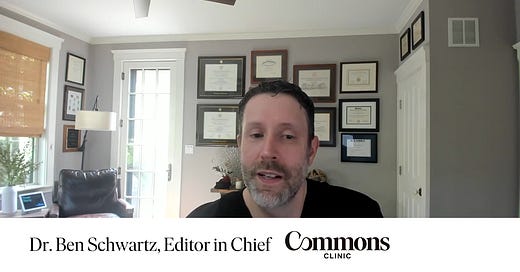Presented by Commons Clinic
A year ago, Blake Madden of the must-read newsletter Hospitalogy wrote a piece on Commons Clinic’s plan to “kill a health system in 5 easy steps.” It was a provocative piece that spoke to Commons’s ambitions and roadmap to the future. A lot can happen in a year — both for startups and the greater healthcare business world. (To wit, who could have predicted United Health’s stock price cratering?)
On the heels of Commons Clinic’s recent Series B announcement and Wholebody program launch, I thought it was a good time to sit down with Commons CEO Nick Aubin and Blake Madden of Hospitalogy for a “vibe session” on the state of healthcare.
Blake’s deep insights and Nick’s irreverent founder’s spirit made for an engaging, informative, and fun conversation!
Insights from Our Conversation with Nick and Blake
Take Away #1: Announcements!
Nick, Blake, and I shared some exciting professional announcements:
Blake is hosting Hospitalogy’s first ever VBC retreat in Austin on September 18th. The 1-day, application-only leadership event is bringing together the brightest minds in VBC — 40 healthcare leaders across health systems and ACOs. Congrats Blake, should be an awesome event!
Nick covered Commons’ recent $26M Series B raise (led by RA Capital) and the launch of the Wholebody program, the next phase in Commons Clinic’s mission to reinvent specialty care. With the model validated in MSK care, Commons is positioned to set a new standard for high-value specialty services.
Finally, I’m joining Commons Clinic in a full-time role as SVP of Care Services & Strategy in September. I couldn’t be more excited to join the company at such an exciting time of growth. I’m a big believer in the vision and can’t wait to leverage my years of clinical experience to help build the next generation of specialty care.
Take Away #2: Fighting the Future?
Blake pointed out that legacy health system margins are being squeezed by rising costs, flat payer rates, and physician-alignment challenges. At the same time, many in the old guard are doubling down on core competencies — inpatient capacity and heads-in-beds. Consumerism and the shift to outpatient care are challenging that approach. Nick countered that some forward-thinking health systems, like Baylor, are more aggressively pursuing new models. While there’s no question higher acuity care will continue to migrate to ASCs, it remains to be seen whether legacy systems can reallocate capital to support business model transformation.
Take Away #3: AI ROI
What would a healthcare conversation in 2025 be without mentioning artificial intelligence? While there’s a lot of hope and optimism for technology’s ability to transform care, ROI remains a big sticking point. Blake’s C-suite intel confirms what many suspect — AI’s most immediate impact may be on revenue cycle management, upcoding, and complexity capture. Technology is expensive and that cost must be justified and re-captured. We’ve already seen this scenario play out when EMRs quickly became billing machines. Everyone’s hope is that AI will revolutionize care by improving diagnostic accuracy, personalizing care, and surfacing deep insights. The reality, at least at first, may be far more mundane — technology being used to get paid more for doing the same. Thankfully, Nick offered a more hopeful take on tech: pairing hard assets (ASCs, imaging, and robotics) with AI to create a Moore’s Law-style cost curve incumbents can’t match. Let’s hope for Nick’s version!
Take Away #4: H1 2025’s Most Interesting Healthcare News
Both Blake and I chose United Healthcare’s unexpected fall from grace with a plummeting stock price and controversies on multiple fronts (Medicare Advantage, AI-enabled prior authorization denials, VBC failures, CEO’s firing). Once hailed as a masterclass in healthcare vertical integration, United now finds itself scrambling to recapture shareholder value and right-size its business. Is this the beginning of the end for one of healthcare’s most entrenched incumbents or merely a bump in the road?
Meanwhile, Nick pointed to the continuing trend toward consumerism, particularly as it pertains to this year’s other, non-AI healthcare innovation darling — longevity. Like value-based care, defining “longevity” can be tricky. Is it biohacking? A tool for the worried well? Or a reimagined version of primary care that allows patients to take greater control of their health? Nick and Commons are betting on the latter with the launch of the Wholebody Assessment, merging early insights with interventional follow-through to close the gap between detection and action.
Take Away #5: Predicting the Next Decade
Nick’s 10-year prediction: fewer hospitals and fewer traditional PCP visits per capita as AI triage, data-rich preventive care, and outpatient technology drive care to new venues. For his part, Blake’s not ready to give up on value-based care but predicts that rhetoric will shift to high-value care — solutions that gain consumer trust first, then bend the cost curve. We wrapped it up by coming back to one of my favorite arguments: value is created intrinsically, not as a byproduct of a payment system or convoluted care model.
Ben Schwartz, MD, MBA
Editor-in-Chief, The Surgeon’s Record
SVP Care Services & Strategy
Thanks for watching The Surgeon's Record webinar! Subscribe for free to receive new posts and support our work.















Share this post